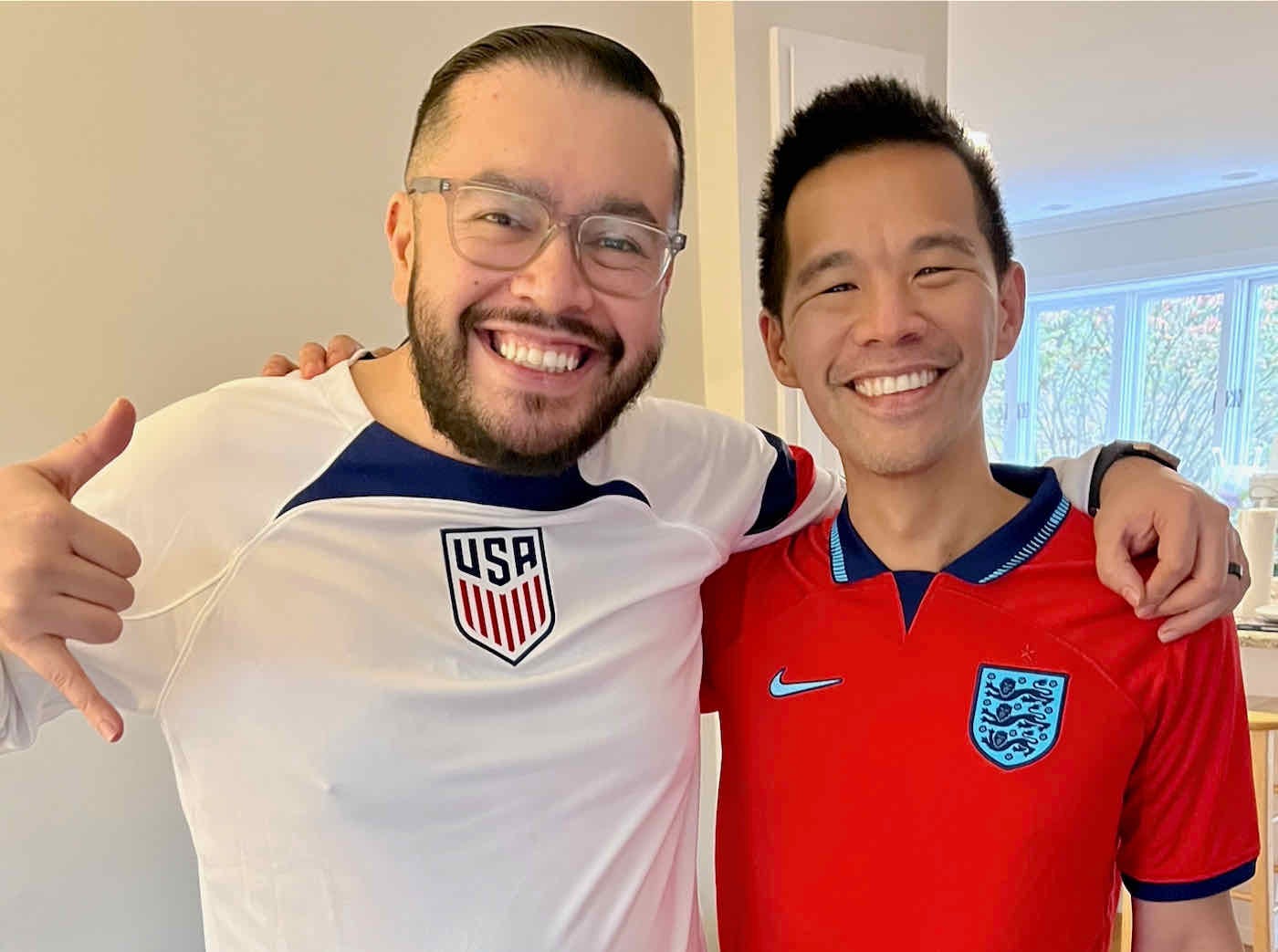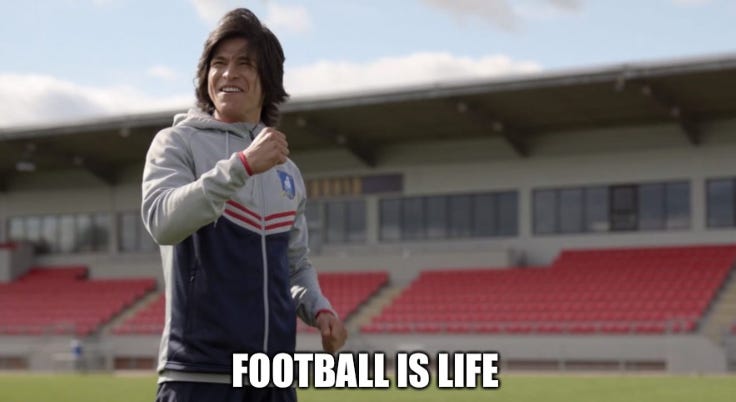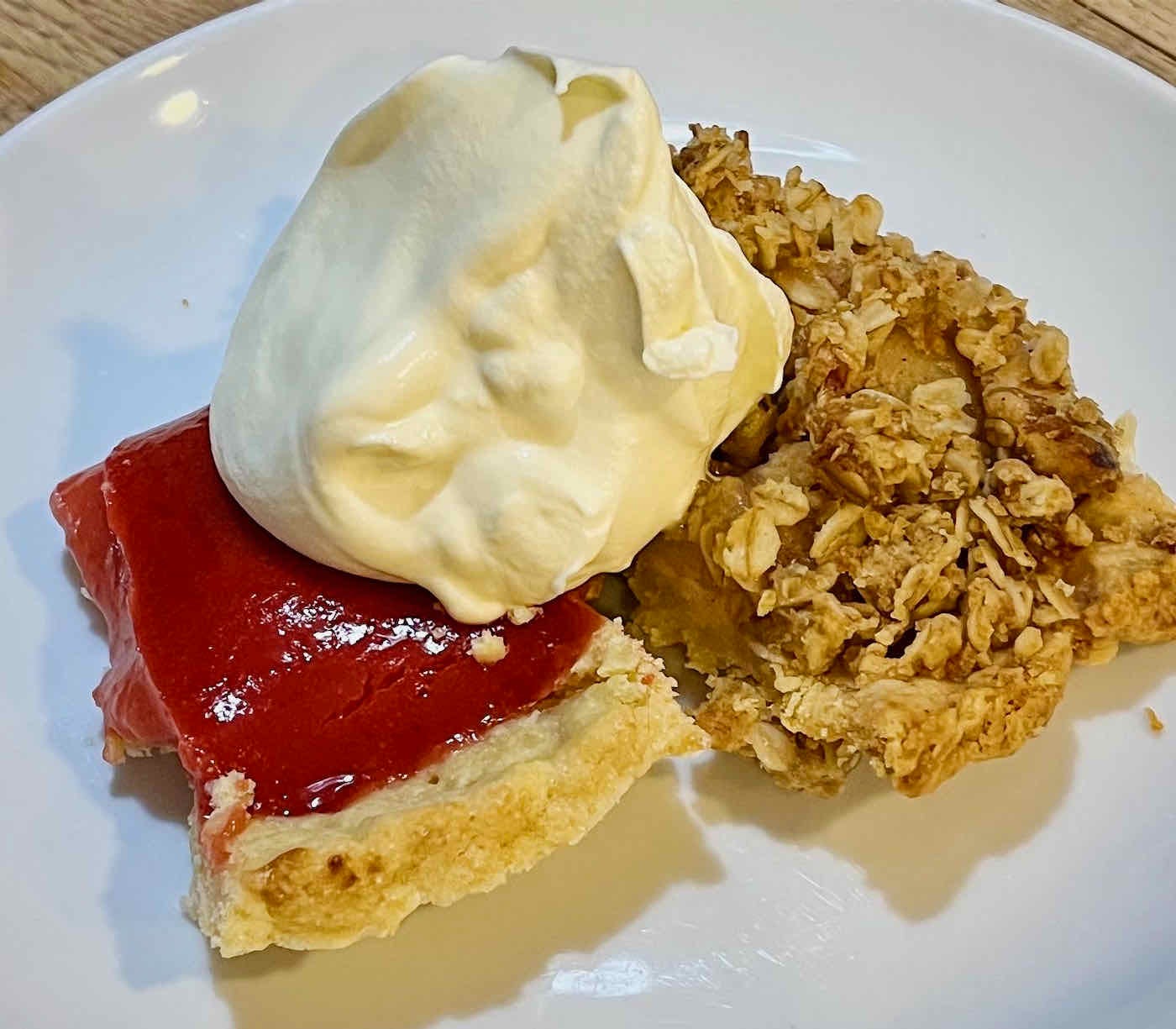The Beautiful Game
Some fragmented thoughts on football (not the American version), Advent, pastries in Buffalo, dumplings in Greenville, gratitude, and butterflies
Advent I
Friday, December 2
Grand Rapids, Mich.
Forgive me for being a little distracted this week, dear reader.
I’ve been thinking about flickering hope, longing for deliverance, and crowds crying out for salvation.
We’re in the midst of the World Cup.

I rarely write about the sports ball, but football—soccer, if you must—has a special place in my heart. I can even tell you exactly when I fell in love with the game.
During the summer of 1998, I lived in Hong Kong with my aunt and uncle and their family. From mid-June through mid-July, I kept odd hours. But they were only odd if you didn’t know what was going on seven time zones away, in France.
The day’s first World Cup match usually began shortly before bedtime—sometimes at 8:30 p.m., sometimes at 10. After those games ended, my uncle, one of my cousins, and I typically slept for a few hours. Then we’d get back up for the late match, which began at 8 p.m. in France—3 a.m. in Hong Kong.
That summer, because we were watching on local TV, I got a lesson in Chinese geography and vocabulary—I’d never before had much reason to know how to say Saudi Arabia or Austria in Cantonese. I also learned players’ names in Chinese before I knew them in English: Zidane, Henry, Baggio, Ronaldo, Šuker, Shearer, Owen. (I already knew who David Beckham was.) Where once I perceived a bunch of guys haphazardly kicking a ball around a big patch of grass, I started to see patterns and strategies. Where once I recognized only raw athleticism, I caught glimpses of the art and the craft of the beautiful game—and in the eyes of this then-closeted gay boy, the beauty became partly, not exclusively, about the players.
Hong Kong has never made it to a World Cup (they have qualified for next year’s Asian Cup, for the first time since the late 1960s), and I can’t remember if my uncle and my cousin were fans of any particular team. But I do recall their profound respect for the game itself. Nor were we the only ones who felt invested: If I woke a few minutes early for the 3 a.m. match, sometimes I’d peer out my bedroom window to watch the lights flickering on in apartments all across the city, as if Hong Kong had suddenly become home to a giant swarm of synchronous fireflies.
Even more than that, what I remember most about those late-night viewings was the feeling of togetherness—the beauty of belonging. As soon as the ref blew the whistle to start play, it didn’t matter that my uncle and cousin were uncomfortable in English or that I was less than fluent in Cantonese. It didn’t matter how little I knew about the game either. We could simply be, and be together.
Every four years since, I’ve watched the World Cup with more than casual interest. And ever since I moved to London in 1999, I’ve been a stalwart England supporter, which, if you know me and my predilection for unnecessary suffering, is pretty much on-brand.
So I’ve been thinking about flickering hope, longing for deliverance, and crowds crying out for salvation—because we’re in the midst of the World Cup and because, for the first time ever, the World Cup coincides with Advent.
Bear with me if your instinct is to say, “But it’s just a game!” “Football is life,” the great philosopher Dani Rojas once said. Sport is a lens through which we can glimpse so much of the rest of our existence, sometimes more easily and accessibly than others. We connect with history and tradition. We try to make meaning, and we seek to make sense of what can seem senseless. We admit all that is imperfect, we anticipate what’s still to come, and we nurture belief in promises yet to be fulfilled.
Sometimes, through sport, we’re able to wrestle with things, even engage with people, in ways that, off the field, we struggle to. On the pitch, you can’t really pretend to have won when you actually haven’t. Those of us in the stands—literally and metaphorically—are willing to risk having our hearts broken. We acknowledge the mistakes of our team, often with unsparing candor. We love our way through it all.
Just as in football, Advent involves lots and lots of waiting—active waiting, hopeful waiting, but waiting nonetheless. Just as in football, Advent resists when much of the world would rather rush toward celebration, because we are compelled to acknowledge that it’s not quite time for that yet. Just as in football, Advent invites us to sit in the midst of both reality and possibility. Just as in football, Advent reminds us that hope is embodied.
I will concede this to the “but it’s just a game” crowd: What happens off the pitch matters so much more than what happens on. Yet even here, the lines can blur—and beautifully so.
At the end of the U.S.-Iran game earlier this week, the American player Antonee Robinson held one of his Iranian counterparts, Ramin Rezaian, as Rezaian wept into Robinson’s shoulder. It’s impossible to know what Rezaian was feeling in that moment: Was he crying because of despair at the loss, which kept Iran from progressing in the tournament for the first time ever? Was he fearful about what fate would meet his team when they returned home, given the unrest in Iran as well as the team’s decision not to sing their national anthem before their first game—an action interpreted as protest? Was it a mix of these things?

We can’t know, but I can say this much: Such a tender encounter between an American and an Iranian, particularly in this kind of spotlight, especially with geopolitics what they are, does not and cannot happen often these days. To watch these two men sharing this moment makes me long even more for that day when all tears will be wiped away, when all shall be healed, when everyone will belong and know freedom unsurpassed.
I don’t know when and how that will ultimately happen, but I have to hope and I have to believe.
Another famed philosopher, Theodore Lasso, once pushed back against the hoary cliche that “it’s the hope that kills you.” “I disagree, you know?” he said. “I think it’s the lack of hope that comes and gets you. See, I believe in hope. I believe in belief.”
So: Go, England. And come, Lord Jesus.
Amen.
What I’m Cooking: We had a delightful Thanksgiving dinner last week. It was just four of us—our friends Werner and April, who drove up from New York City, and Tristan and me. Well, five, if you count the Fozz. Fozzie and I picked up our turkey a couple of days before from Rainbow Poultry Farm, a small, family-run operation near the Massachusetts-Rhode Island border. And I was super-happy that the potatoes, carrots, sage, and thyme on the table all came from our own garden.
For dessert: I really don’t like pumpkin pie. So instead, I tried the cranberry curd tart recipe from The New York Times. It’s a keeper! Except I did not roast the hazelnuts and then make flour out of them for the crust, because honestly, that just seemed like a lot of work. Instead, I made a basic pâte sucrée.
I also made an apple pie. As always, I used the Sister Pie recipe for crust. But rather than doing a top crust, I did an oat-and-walnut streusel topping. Can’t complain about how any of it turned out, especially with the giant glob of whipped cream on top.
What I’m Eating: I’m more convinced than ever that pretty much wherever you go, with a little research, you can find something delicious to eat. Two recent favorites:
Butter Block, which produces exquisite pastries in Buffalo, New York. Eight years ago, Colleen Stillwell began selling a handful of croissants each week to a shop in Buffalo that features the output of local farmers and bakers. Two years ago, she finally opened a brick-and-mortar location in the Five Points neighborhood. We always drive through Buffalo when we’re on our way to and from Cape Cod, and we’re always grateful when those drive-bys happen on a day when Butter Block is open (Thursday to Sunday). On our most recent visit, we picked up an outstanding kouign amann, a gorgeous morning bun, a maple-bacon pastry, and a savory danish with gruyere and caramelized onion. The layers! The lamination! The flavors! We’ve had pastries all over the world, and I never thought I would say this, but some of the best anywhere can be found in Buffalo.
Aryana, an outstanding Afghan restaurant in Greenville, S.C. A couple of weeks ago, I was passing through Greenville en route to Kanuga, the Episcopalian retreat center in the mountains of North Carolina, and I had one meal—not to be wasted! Chef Nelofar Mayar is a warm presence in the dining room. At lunch, she serves a single plate; all you have to choose is meat, vegetarian, or vegan. I chose meat, of course. That day’s plate offered a generous portion of succulent, richly spiced chicken; two meat-filled mantoo—dumplings topped with yogurt sauce; lubia, a slowly simmered kidney-bean curry fragrant with tomato and coriander; gulpi, a delicious curried cauliflower, tinged gold thanks to turmeric; and kabuli pulao, basmati rice with carrots and raisins. Comfort food, it turns out, transcends borders.
What I’m Reading: I took last week off to focus on being with loved ones and cooking. But the spirit of gratitude in this essay by Margaret Renkl transcends the Thanksgiving holiday and is no less relevant this week than last. Renkl is perhaps my favorite writer in the Opinion section of The New York Times. She consistently pens pieces that slow me down and that prompt me to reflect on beauty and goodness.
We can use whatever good news we can get these days, right? This High Country News story about the revival of a rare butterfly in Oregon illustrates vividly how interdependence among species is essential. As the piece notes, “Survival is a collaborative process.” And diversity is sustainability.
A couple of programming notes:
1. My friend Annalise Hume is a professionally trained dancer, spiritual director, and practical theologian. At Evolving Faith this year, she offered a powerful workshop that integrated movement and spirituality, and on December 11th at 7 p.m. Eastern, she’s teaching a pay-what-you-wish, movement-based meditation class via Zoom called Embodied Advent. “During the Advent season, we sit with a sacred remembrance of the coming of Jesus—the incarnation, God in human form,” she says. “And if the incarnation of Christ insists on anything, it insists that our physical bodies matter to God.” Annalise is such a gifted teacher that she even once got Tristan and me to dance in public. You can sign up here.
2. I’m headed to North Carolina next week to cook dinner for a friend as well as to preach at Crosspointe Church in Cary. If you’re in the Research Triangle area, consider joining us in-person for worship on Sunday, December 11, at 10 a.m. Or if you prefer to be with us online, you can always access Crosspointe’s online worship service via YouTube.
Have you been watching the World Cup—and if so, what team(s) are you cheering for? In addition to England, I almost always cheer for the unexpected contenders and the underdogs—so here’s hoping that Morocco will upset Spain and Australia will shock Argentina in the next round. Also, what are you carrying with you into Advent? What can I be holding in prayer?
As always, I’m so grateful we can stumble through all this together, and I’ll try to write again soon.
Yours,
Jeff







My wife and I sponsored her Chinese Mom living in Shanghai to join us in Boston over 20 years ago. Mom was an avid sports fan and that was one of the many connections we shared (also, we both had a “thing” for her daughter). Before her arrival I added the NBA and Premier League channels to our cable and as a former competitive athlete it wasn’t long before I joined Mom in front of the TV watching Kobe,et.al. and the British footballers. One night I heard Mom going downstairs to the living room around 3:30 and thinking that she might be ill, I followed her and found her on the couch under the throw blankets watching a “football” match between China and Japan. It was the World Cup tournament and despite the time zone challenges (I think the games were played in Paris that year) Mom did her best to catch many of the games. Growing up I was an American footballer in high school and knew little of the other football. The game had not caught on the way it has in recent years, but there was something about this tournament that had its grip on me. Actually, the grip’s tentacles began a few years before when, by accident, I watched the women teams from America and China play to a “nil-nil tie.” I was on a business trip to San Jose and was sent inside to my hotel room on that Sunday by the punishing Silicon Valley heat and humidity and by chance flipped on the game. Not sure why but I quickly got hooked and watched every second the match plus shootout (this was the game that produced the famous Brandy Chastain bra-revealing goal). It remains the single-most exciting sporting event I have ever witnessed. I have played sports all my life and ‘futbal” is indeed the most elegant game of all. I wish I played it when I was a young athlete.
Mom worked up an appetite during the first half of the match and so I trotted into the kitchen and whipped us up a cheese-pepper-scallion omelet with a side of rye toast. Mom cleaned her plate and asked for more. It was barely dawn and the two of us were as excited as young school kids. I think Japan bet China by a single goal if I remember, but I know who the real winner was. Yours truly. Gooooooooooooooooooooooooooooooooooooooooooooooooooooooooal!!!
Jeff! So many memories flooding back of watching World Cup matches at all hours with my sons.
"The beauty of belonging."